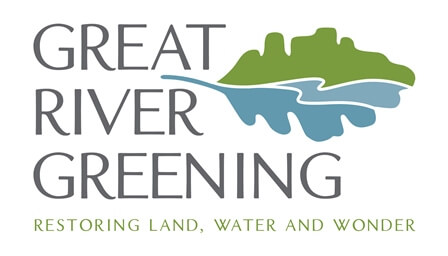 Reading Time: 2 minutes
Reading Time: 2 minutesWritten by Jonathan Eisenthal
In its 21 years, Great River Greening has worked primarily on wildlife habitat restoration, marshaling 39,000 community volunteers to help restore 18,000 acres of Minnesota prairies and forests.
In 2011, the organization began to move forward with comprehensive watershed work to improve water quality—work that has recently advanced with the help of grants and technical support from Minnesota Corn Growers Association (MCGA).
Seven Mile Creek, which empties into the Minnesota River just south of St. Peter, has become one of several collaborative efforts between Great River Greening and MCGA.
“We are collaborating with 25 or so stakeholders (in the Seven Mile Creek watershed partnership), where we have done habitat restoration and soil erosion control measures and gully erosion revetments,” says Steve Huckett, Conservation Programs Coordinator for Great River Greening.
A revetment is an engineering streambank slope that uses the placement of rocks and other features to slow water down water entering the watercourse, so that it does not erode soil and transport sediment and nutrients into the water.
Huckett adds, “We also have a bioreactor that is working on tile drainage water to remove nitrates, and two more are planned.”
Outreach to other landowners in the watershed is an ongoing process, with Great River Greening and MCGA hopeful that more will join in the water quality restoration effort.
“Our organizations have been building a working relationship over the past several years, serving together on the Great River Greening Agricultural Water Advisory Committee and participating in the Seven Mile Creek project discussions as well,” says Paul Meints, director of research for MCGA. “We look forward to continuing to strengthen how our organizations can work together to improve sustainable agriculture and improved surface and ground water quality in Minnesota”.
According to Huckett, one thing that would move forward the effort for farmers to engage in water quality efforts, would be the development of the ‘bio-economy.’ Essentially, this idea provides that there would be opportunities to develop revenue streams and markets from products taken from land devoted to ecological services, rather than farming.
“We need for people to incorporate restoration into their daily activities,” says Huckett. “Ultimately, urbanite and landowner alike. Everyone needs to take part and together change how our daily lives impact water quality.”

